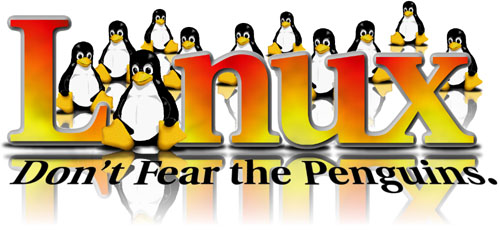
What is Linux?
The Best Sites for New Linux Users
Visit http://themes.org/joelinux/

The Best Sites for New Linux Users
Visit http://themes.org/joelinux/
![]() With
a slogan like 'News for nerds. Stuff that matters', it's gotta be cool.
Slashdot is a forum based news service where readers send in links to interesting
stories. The site's maintainer, Rob Malda, sifts through the entries, posts
his favourites, and readers comment on the stories.
With
a slogan like 'News for nerds. Stuff that matters', it's gotta be cool.
Slashdot is a forum based news service where readers send in links to interesting
stories. The site's maintainer, Rob Malda, sifts through the entries, posts
his favourites, and readers comment on the stories.
 Freshmeat
has become the standard repository for Linux program updates. If you're
in the market for something new, it's going to appear here first.
Freshmeat
has become the standard repository for Linux program updates. If you're
in the market for something new, it's going to appear here first.
 About
the only code that isn't posted to Freshmeat first (although they quickly
catch updates!) is kernel source. If you want to stay on the cutting edge
of kernel development, you'll find the latest here.
About
the only code that isn't posted to Freshmeat first (although they quickly
catch updates!) is kernel source. If you want to stay on the cutting edge
of kernel development, you'll find the latest here.
 When
it comes to grabbing great looking themes for your desktop, Themes.org
can't be beaten. In addition to themes for all the popular window managers,
Themes.org also has a collection of tiles and root backgrounds .
When
it comes to grabbing great looking themes for your desktop, Themes.org
can't be beaten. In addition to themes for all the popular window managers,
Themes.org also has a collection of tiles and root backgrounds .
 Without
the GNU project, we probably wouldn't have Linux today (at least not as
we know it). If you are looking for some way to give back to the community,
this is a good place to begin looking.
Without
the GNU project, we probably wouldn't have Linux today (at least not as
we know it). If you are looking for some way to give back to the community,
this is a good place to begin looking.
Linux is quite possibly the most important free software achievement since the original Space War, or, more recently, Emacs. It has developed into an operating system for business, education, and personal productivity. Linux is no longer only for UNIX wizards who sit for hours in front of a glowing console (although we assure you that many users fall into this category).
Linux (pronounced with a short i, as in LIH-nucks) is a UNIX operating system clone which runs on a variety of platforms, especially personal computers with Intel 80386 or better processors. It supports a wide range of software, from TeX, to the X Window System, to the GNU C/C++ compiler, to TCP/IP. It's a versatile, bona fide implementation of UNIX, freely distributed under the terms of the GNU General Public License
Linux can turn any 80386 or better
personal computer into a workstation that puts the full power of UNIX at
your fingertips. Businesses install Linux on entire networks of machines,
and use the operating system to manage financial and hospital records,
distributed computing environments, and telecommunications. Universities
worldwide use Linux to teach courses on operating system
programming and design. Computing
enthusiasts everywhere use Linux at home for programming, productivity,
and all-around hacking.
What makes Linux so different is that it is a free implementation of UNIX. It was and still is developed cooperatively by a group of volunteers, primarily on the Internet, who exchange code, report bugs, and fix problems in an open-ended environment. Anyone is welcome to join the Linux development effort.